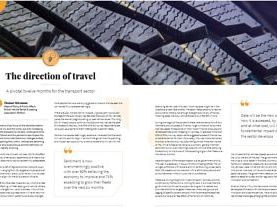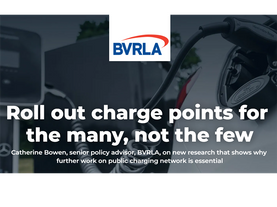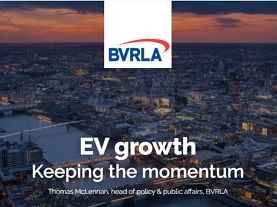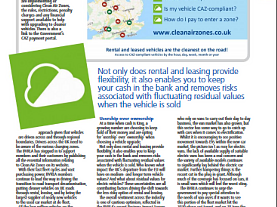BVRLA's Rachael Hewish writes for GreenFleet magazine
In recent months Transport, Environment and Business Ministers have all signalled the Government’s vision for an ultra-low emission road transport system in the UK. As Transport Minister, Jesse Norman explained at the launch of the BVRLA’s recent ‘Plug-in-Pledge’; “The coming decades are expected to be transformative for our motor industry, our national infrastructure and the way we travel. […] We want to work in partnership with industry and businesses to make these shared ambitions a reality, so we welcome the commitment made by the BVRLA today.”
If the Department for Transport is to meet the ambitious targets set out in this year’s ‘Road to Zero’ strategy, over half of new car sales in the UK will need to be ultra-low emission in just 11 years’ time. This will require an exponential increase from the current level of 6.5% in just over a decade.
Feeding into this vision, next year London will witness the launch of its Ultra-Low Emission Zone, followed shortly afterwards by the introduction of Clean Air Zones across the UK. These zones will stipulate only the highest grade, most environmentally friendly versions of vehicles will be allowed access to Birmingham, Leeds and Southampton city centres in a bid to improve air quality in some the country’s most worrying pollution hotspots. These developments are a practical manifestation of the zero emission promises being made from the top by Government and will force motorists to adapt or pay a fee for continuing to use older, more polluting vehicles.
Industry navigates the way forward
With the BVRLA’s members being responsible for 1-in-8 cars, 1-in-5 vans and 1-in-5 trucks on UK roads - totalling almost five million vehicles – the rental and leasing industry has a large stake in the transport ecosystem. Furthermore, due to the number of vehicles they purchase and the frequency of fleet replacement cycles, BVRLA members will be a key driver on the journey to zero emissions.
Thankfully the Road to Zero strategy clearly recognises the vital role industry must play in order to secure this transition, and the BVRLA has seized the opportunity to demonstrate the fleet sector’s ability to pick up that gauntlet. Earlier this summer the association launched a ‘Plug-in-Pledge’ which would see its members’ combined plug-in vehicle fleet size surge from 50,000 today to 720,000 by 2025. By that time, vehicle rental and leasing companies would be buying 300,000 plug-in vehicles per year. This represents an increase in the industry’s share of annual new plug-in hybrid and pure electric vehicle registrations from 36% to 60%. The pledge is therefore a clear demonstration of the vehicle rental and leasing industry’s commitment to playing a vital role in delivering this ultra-low emission goal.
The majority of the fleet referenced in the ‘Plug-in-Pledge’ would be company cars. The BVRLA is forecasting that this portion of its member fleet would be responsible for 200,000 annual registrations by 2025, with a total fleet of 430,000 plug-in company cars. The remaining 100,000 annual new plug-in vehicle registrations promised by 2025 would be a combination of rental and personal lease or Motability cars, and vans. This portion of the BVRLA membership would have 290,000 plug-in vehicles on fleet by 2025.
|
Case study: BVRLA members lead the way Supporting the launch of the ‘Plug-in-Pledge’, Zipcar highlighted their roll-out of a fleet of Volkswagen e-Golfs on its London network, as part of efforts to tackle air quality in the capital. 325 zero-tailpipe emission e-Golfs will join Zipcar’s London fleet this year representing a major step forward for the fleet and showcasing the potential for other fleet operators to follow in their footsteps. As Gerry Keaney, BVRLA Chief Executive explained, “Our members are standing ready to make a large-scale transition to zero-emission motoring, with some, such as Zipcar, already taking great strides forward with the composition of their fleets. “Provided that Government can match their ambition with a supportive tax regime and more help with charging infrastructure, then progress will be made far quicker.” |
Aligning policy objectives
Despite all this huge potential, the fleet sector’s ability to fully enact the BVRLA’s ‘Plug-in-Pledge’ will rely heavily upon the Government aligning its policies to ensure the tax regime is fit for purpose and supportive of the wider environmental, cross-departmental ambitions.
As recent polling by YouGov has shown, 42% of senior decision makers in small and medium sized businesses who use vehicles, would be likely to increase the number of electric vehicles they use if national and local government were to offer greater support, for example in the form of tax incentives, free parking and more charging infrastructure. Undoubtedly the promises made within the Road to Zero strategy to introduce £400 million investment into charging infrastructure and to ‘provide a uniform method of accessing public charge points’ are very positive steps forward, but the BVRLA believes even more must be done to enable the necessary change to happen.
The BVRLA has therefore called upon the Government to bring forward the reduction to 2% from the current 9% company car tax for ultra-low emission vehicles. This would bypass the planned interim rise to 16%, which will only serve to disincentivise employees from choosing an ultra-low emission vehicle in the short term. Bringing down company car tax to 2% would not only provide a valuable incentive to employees taking a company car but would also signal the Government’s intention to support the growth in the plug-in vehicle market.
The BVRLA is also asking Government to confirm and publish the tax rates on ultra-low emission vehicles for the next five years. This activity has been enacted in other forms of taxation, most notably corporation tax, where it has provided much-needed certainty and stability to the corresponding markets as a result.
Parliamentarians pledge support
The association’s ‘Plug-in-Pledge’ and its policy calls for further action from Government have been publicly backed by cross-party politicians with 30 parliamentarians joining over 100 BVRLA members and guests at a launch event for the Pledge in the House of Commons in July. Whilst at the reception, MPs and peers added their names in support of the Pledge and took the opportunity to voice their appreciation for the leading role BVRLA members are taking in the drive to improve air quality. Since the event, many more MPs have also pledged their support.
There is a real appetite to support the Government’s vision for lower emission transportation, both politically and from businesses. The desired change will require combined commitments from the industry and the Government. The BVRLA will continue to work with the Government to secure the necessary tax and infrastructure environment that businesses need to realise their low emission potential.
BVRLA Director of External Relations and Communications, Toby Poston joined a panel of experts at the Zero Emission Vehicle Summit in Birmingham this month, where he made clear how company car tax and capital allowances are holding back the potential for even greater growth. The Summit, which was opened by the Secretary of State for Transport, Chris Grayling, was attended by over 4,000 people and speakers from vehicle manufacturing, industry bodies, environmental organisations and other specialists from across automotive – all keen to play a role in driving cleaner growth.





